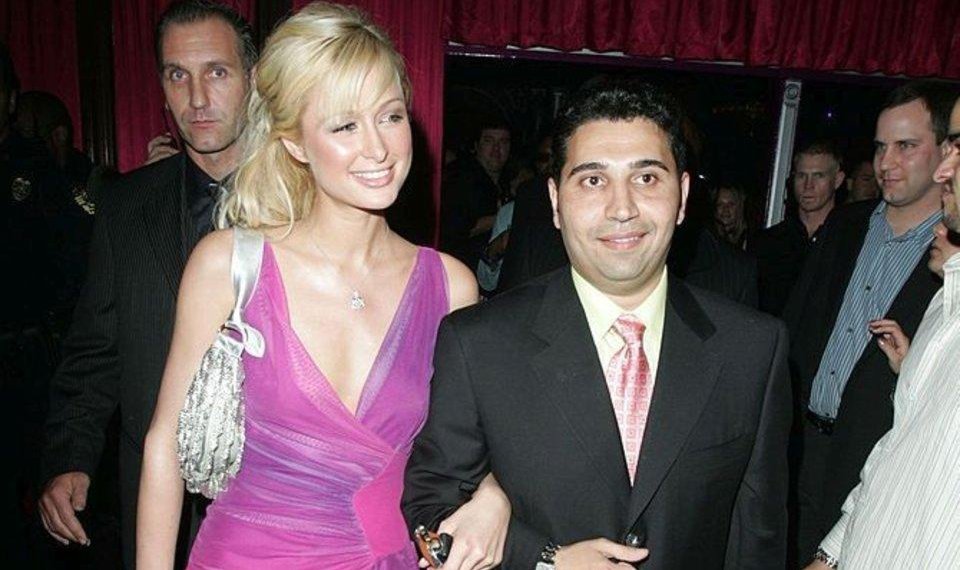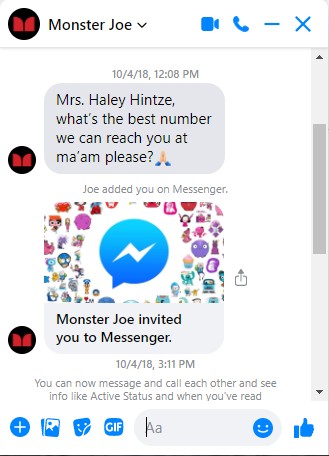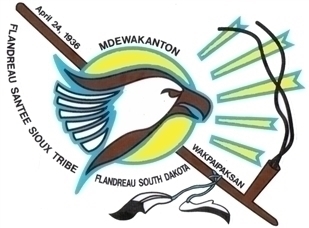This one’s been gestating in your faithful scribe’s brainpan for a few weeks, and it’s going to hop around a bit in the getting there, but it’s a heck of an ongoing tale. It involves Fereidoun “Fred” Khalilian, who also fancies himself as “Prince” and “Khalifa”, and who has for many years tried to insert himself into what he imagines as the vast stream of riches that online gambling represents.
The thing is, Khalilian just can’t stay out of the legal system as he’s bounced from one project to another, all of them abject failures to the people Khalilian has somehow talked into funding his ridiculous projects, over and over again. The “fraudster” thing comes from his two separate FTC cases involving fraudulent telemarketing and illegal robocall operations, in 2000 and 2010. The latter case saw him fined more than $4 million for his transgressions.

If one wanted to go further afield on background, there’s the time he punched a waitress at his Miami nightclub, or the two rape allegations he’s faced, one of which includes the time that the Iranian native also falsely claimed he had diplomatic immunity while facing imminent arrest.
To say the dude is a walking, talking piece of shit is a massive understatement, and he’s exactly the type of person who should never be allowed anywhere near the worlds of online poker and online gambling. Of course, that’s what happened, to the lasting regret of two different Oklahoma tribal nations, nearly $20 million later.
The PokerTribes.com and PokerTribe.com sagas
The tribal thing was already in the works when Khalilian’s name first splashed across the online-poker scene, in the form of a claimed $400 million promotional deal that rapper Soulja Boy claimed to have reached with Khalilian’s World Poker Fund Holdings company in 2016. The claims were ridiculous, and while the poker world paid little attention to the nonsense, at least a few mainstream outlets covered it, until one of them, Forbes, finally did a little homework on the matter.
Forbes’ piece touches on the tribal part of the matter just lightly, by way of exposing Soulja Boy’s and WPFH’s claims as bogus, but the poker story inside was the deal Khalilian and his company had previously managed to ink with the Iowa Tribe of Oklahoma.
Khalilian had promised riches to the Iowas through the marketing and operation of pokertribe.com, a project that was supposedly going to allow the tribal nation to run a huge online gambling operation from their reservation. The tribe eventually sank at least $10 million into Khalilian’s project; more on this in a bit.
Oddly enough, it was the second time that Khalilian had played an Oklahoma tribal nation for a big chunk of money. In 2013, he’d convinced the Cheyenne and Arapaho Nations of the immense value of his dreams, and they gave him $9.7 million for what was essentially a nothingburger, originally called pokertribes.com.

The Cheyenne and Arapahos eventually sued Khalilian for their lost investment, though the money was long gone. Khalilian had used a chunk of the money to pay off that old FTC marketing-scam debt, and the rest went to the luxurious lifestyle that Prince Fred has always preferred to live. A few of the Cheyenne and Arapaho got wise to his dealings early on, but money spent poorly is usually money lost.
How the Iowas managed to get taken for the same ride as the Cheyenne and Arapahos is one of the unanswered mysteries of the whole saga. Khalilian seemingly possesses the proverbial skill of being able to sell air to his victims, but the pokertribes/pokertribe concept was pure nonsense from the start. Despite the federal ruling that Khalilian sold his tribal backers about being able to create an online empire, the prevailing legal thought was that the ruling enabled such online gambling from customers already on that specific tribe’s reservation lands.
That thought was confirmed in 2018 when a California nation ruled against the Iipay Nation of Santa Ysabel, which had similar dreams. The Iipays had launched PrivateTable.com in 2014, and had it shut down by state and federal authorities within a day. That the two Oklahoma tribes — particularly the Iowas — might not have conducted due legal diligence is also an open question, but money spent poorly…
The Iowas were eventually faced with two choices. They could either run an on-reservation-only site with very limited revenue possibilities, or they could attempt to launch a site internationally and play the American-tribal-nation card as a unique marketing angle.

They eventually decided on the latter, obtaining approval from regulators in the Isle of Man to launch a site called GreySnowPoker in 2018. One curiosity is that in order to win approval to launch, the Iowas had to adhere to four unpublished conditions. One of them, so strenuously believes this writer, is that Khalilian and his operation had to be jettisoned, and something to that extent appeared to occur in 2017.
It didn’t matter for the Iowas and GreySnowPoker, which really never had a chance. The company hired an eastern European software startup and a handful of experienced poker-industry people, but by late 2020, it was out of business. With about $10 million sent Khalilian’s way and at least a few million more invested into the GreySnowPoker failure, it was a massive waste of tribal funds.
Meanwhile, Khalilian kept on spending freely, was found guilty of ripping off a business partner for another $4.7 million, and discovered cryptocurrency as a new online-gambling angle. The ripping-off-the-business-partner story is quite fetching, including a mention of Khalilian driving an auto worth $1.1 million to the proceedings and winking to the jury before they began to deliberate his case.
The Monster.com hustle
And once again, he managed to sell those online-gambling-fortune dreams to another well-heeled sucker. This time it was Noel Lee, the founder of popular “Beats” headphones maker Monster Technology Group, who decided that Fast Freddy was just what he needed for his company’s COO role. Lee and Monster also acquired Khalilian’s gambling-software entity, Universal Entertainment Group (UEG).

As a famous move line once told us, “He chose poorly.” Monster’s relationship with Khalilian lasted less than a year. In one of the strangest-ever business press releases I’ve ever read, Monster detailed the sundering of its relationship with Khalilian, also stating that it had obtained a restraining order against him.
This paragraph from the release stands without equal:
“Fereidoun Khalilian (also know as Fred Khalilian and Prince Fred) and the team he brought into the company to do a hostile takeover, has been successfully exited out of the company as of July 27, 2018. A temporary restraining order has been issued against the former executive for the protection of numerous employees of Monster against threats of mutilation, death, and threats to family, in the Superior Court of California, County of San Mateo. A police report was also filed with the South San Francisco Police Department and other law enforcement agencies, including the FBI, against Mr. Khalilian containing, allegations of fraud, theft & conspiracy.“
The release included a compilation of 17 different links to Khalilian’s past transgressions (none of which were my stories, sadly). It was at about this time that I received a strange missive on Facebook from someone calling himself “Monster Joe,” who sought my phone number to presumably talk about the Monster happenings.
Yeah, I don’t give that out to strangers, but an e-mail address? Sure; that’s how I do business and conduct my career. Within just a few hours, I was bombarded with roughly two dozen emails from Khalilian himself, with various missives and tons of attachments that ranged from his contracts with the Cheyenne and Arapaho to secret recordings of his conversations with Monster CEO Lee.

I’ve never listened to those recordings, and for Khalilian to somehow think I was going to transform into his savior represented a major disconnect with reality. He or one of his waterboys had at one point created an online domain in my name and pointed it at a non-factual smear piece that a cheap affiliate outlet had written about me years earlier, in what I guess was an attempt to discredit my ongoing reporting on the PokerTribes saga.
It comes with the territory, I guess; if you’re willing to swing hard — and I usually am — sooner or later someone swings back. (I did forward those recordings to another party that expressed interest, however.)
The Monster tale bears some more detail. It turned out that the gist of the situation resulting in Khalilian’s firing was his alleged theft of Lee’s identity to use with the accompanying alleged misappropriation of hundreds of thousands of dollars via Lee’s black American Exchange credit card. The embezzled funds allegedly went for more lifestyle extravagances for Khalilian.
And in a kicker to that tale, what began as a civil complaint by Lee and Monster did indeed turn criminal. In May of 2020, Fereidoun was charged in a California Superior count on charges of embezzlement and identity theft, both felonies. The case is ongoing, with plenty of pre-trial machinations, such as a Mike Postle-like filing by Khalilian’s initial attorney to be recused from the case. The next hearing in the case occurs in June.
Blockchain Consulting Group and the tribal casino industry
Think you’re all caught up with all things Khalilian? Oh, hell no; not even close. See, Khalilian just cant quit the idea of becoming fantastically rich via online gambling, and the whole crypto thing perpetually represents that “next big thing” that could turn someone’s dreams into reality.
Around the time Khalilian’s dreams of wealth at Monster came crashing to earth, he created another startup, called Blockchain Consulting Group. As with his PokerTribes and PokerTribe schemes, the investment targets are American tribal nations. This time, though, the wheelin’-and-dealin’ Freddy has surrounded himself with a larger supporting cast of characters, some of whom have legitimately solid backgrounds. The group’s “Leadership Team” lists no fewer than 28 members:



Amazingly, Khalilian’s on-site bio brags about his stint at Monster, seemingly hoping investors remain oblivious to his sordid past and the felony charges he currently faces. “Fred Khalilian is the former President and Chief Operating Officer of Monster Inc. He is the second largest shareholder for all ‘Monster’ Companies Worldwide,” it begins. Chutzpah knows no bounds.
Yet Khalilian notwithstanding, it’s astounding, simply astounding, to see the number of legitimately accomplished folks he’s involved with this project.
Paulette Jordan, for example, is a former US Representative from Idaho (2014-18) who unsuccessfully ran for the US Senate in 2020. Russell Wiegel is a prominent securities lawyer from Florida who currently serves in that state’s Office of Financial Regulation. Yvonne Bustamante is Panama’s honorary consulate general to Australia. Alessio Mack, who appears to be the group’ tech lead, is a cryptocurrency expert and the founder of VIBEhub.

Most of the group offers similarly solid credentials. Then again, poker fans probably recognize the name and face of Dan Fleyshman as one of Khalilian’s co-founders, even if his credentials aren’t near the others’. I’ve never met the guy, but I’ve always pigeonholed him as over-the-top entrepreneurial, to the point of all talk and no results.
Fleyshman is perhaps most noted for his stint at the helm of the poorly timed and short-lived Victory Poker, which often featured hilariously misogynistic advertising, red-carpet parties, and Fleyshman blowing $25,000 in Victory Poker startup money on an artist-designed — but still frivolous — logo (right). A few years later he resurfaced as the head of Ivey League, which fared every bit as well, and from there on to this Blockchain Consulting Group, amid his other business ventures.
The rest of the group’s leadership board includes other tech and entrepreneurial types, a handful of what appear to be Khalilian’s old friends from his nightclub and music days, and a healthy helping of tribal officials from across the US. With that mix in place, it’s little surprise that the company bills itself as developing “blockchain-powered groundbreaking technology solutions that will enhance the American Indian Tribal Casino Industry.”

The group already seems to have at least one tribal-nation taker for whom to develop something both crypto- (Ethereum-based) and gambling-related. In March of 2020, South Dakota’s Flandreu Santee Sioux Tribe filed extensive paperwork with the Securities and Exchange Commission (SEC) for the creation of the Dakota Coin Authority (DAK).
Under the terms of the project, the tribe-operated authority will market up to one billion DAK securities coins, described as “digital smart contracts newly minted on the Ethereum blockchain,” which will be sold at an initial price of ten cents each. A second coin, the DAK Utility Token, will represent how dividends will be paid, and the two coins will have separate utility and functions.
The tribe, which operates South Dakota’s Royal River Casino, views the project as a tool for the eventual operation of an online-gambling enterprise, while also using the crypto coin’s offering as a way of raising funds for the tribe’s other operations and to improve the quality of life of tribal members.
Khalilian’s Blockchain Consulting Group will run the entire project in exchange for 49% of the proceeds, and a billion DAK coins at ten cents each adds up to a $100 million revenue influx, if an IPO goes as dreamed. And that’s just the start: the tribe’s filing hopes the project will generate another $300 million from the DAK Utility Token, plus another $300 million from additional revenue streams, for a total dreamed-for haul of $700 million.
Then again, the 84-page prospectus includes more than 20 pages of why the project might not go as planned and why investors’ funds could be at risk. It also, as is required by law, details the backgrounds of the key employees of its software-development partner, Blockchain Consulting Group. For Khalilian, that’s just a rehash of his BCG bio and an acknowledgment of his old FTC sins, and nothing else:
“Fereidoun Khalilian a/k/a Fred Khalilian a/k/a Fred Khalifa (age 48) is the Chairman and is a director of BCG. Mr. Khalilian was the president and chief operating officer of Monster Inc. between January 2016 and January 2018. Since September 2011 to the present, he has been the chief executive officer of Hollywood Production Group where he manages artists, movie producers, and musicians, and between October 2011 to December 2018, he was the chief executive officer of Universal Entertainment Group, an entertainment software developer. Mr. Khalilian is the subject of two stipulated Federal Trade Commission injunctions from 2010 and 2001, respectively, banning him from telemarketing and prohibiting him from making misrepresentations in connection with automobile warranties (see FTC v. Fereidoun “Fred” Khalilian, et al., Case No. 10-cv-21788-MGC (S.D. Fla.) for more details), and requiring him to maintain certain records through January 6, 2021, and banning him from telemarketing of vacation travel packages, making misrepresentations, and violating the FTC’s Telemarketing Sale Rule (see FTC v. Leisure Time Marketing, Inc., et al., Case No. 00-Civ-1057-ORL-19B (M.D. Fla.) for more details). Mr. Khalilian has paid the FTC the monetary redress ordered in both cases.”
That’s called being technically true, but it sure misses the point. It’s also true that I can be cynical to an extreme, yet everything Khalilian touches sure seems to turn to poison. One can only wonder how it’s going to play out this time.


Fred Khalilian is a fraud.